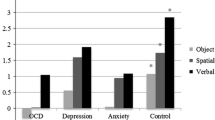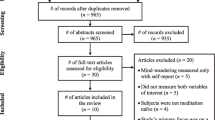Abstract
We examined the interrelationships between higher-order cognitive functions—mindfulness, self-control, and working memory—that appear to be component processes that underlie executive function (EF) and their association with indicators of mental and behavioral health. Data were collected from first-year medical students attending a large private university in California (N = 31) via a computer-based questionnaire which was administered via email hyperlink. Results indicate that self-control schedule (SCS) scores were significantly correlated with the negative dimension of positive and negative affect schedule scores (r = −0.59, p < 0.05), psychological well-being scale scores (r = 0.46, p < 0.05), and mindful attention awareness scale (MAAS) scores (r = 0.35, p ≤ 0.10). The planful behavior dimension of the SCS was correlated with MAAS scores (r = 0.38, p < 0.10), automated operation span task scores (r = 0.51, p < 0.05), and total SCS scores (r = 0.72, p < 0.01). Large and significant inverse correlations were found between current meditation practice and alcohol use (r = −0.56, p < 0.05) and AUDIT scores (r = −0.48, p < 0.05). Findings from this pilot study suggest that an overlap exists between some component processes of EF; however, the majority of variance in the components is not shared. Moreover, these higher-order cognitive processes appear to have protective relationships with substance use and are positively associated with self-reported meditation practice.
Similar content being viewed by others
References
Alfonso, J. P., Caracuel, A., Delgado-Pastor, L. C., & Verdejo-García, A. (2011). Combined goal management training and mindfulness meditation improve executive functions and decision-making performance in abstinent polysubstance abusers. Drug and Alcohol Dependence. doi:10.1016/j.drugalcdep.2010.12.025.
Baldwin, D. W. C., Jr., Hughes, P. H., Conard, S. E., Storr, C. L., & Sheehan, D. V. (1991). Substance use among senior medical students: A survey of 23 medical schools. Journal of the American Medical Association, 265(16), 2074–8.
Bausell, R. B., & Li, Y. F. (2002). Power analysis for experimental research: A practical guide for the biological, medical, and social sciences. New York: Cambridge University Press.
Beaver, K. M., Wright, J. P., & Delisi, M. (2007). Self-control as an executive function: Reformulating Gottfredson and Hirschi's parental socialization thesis. Criminal Justice and Behavior, 34(10), 1345–61.
Breslin, F. C., Zack, M., & McMain, S. (2002). An information-processing analysis of mindfulness: Implications for relapse prevention in the treatment of substance abuse. Clinical Psychology: Science and Practice, 9(3), 275.
Brown, K. W., & Ryan, R. M. (2003). The benefits of being present: Mindfulness and its role in psychological well-being. Journal of Personality and Social Psychology, 84(4), 822–48.
Cahn, B. R., & Polich, J. (2006). Meditation states and traits: EEG, ERP, and neuroimaging studies. Psychological Bulletin, 132(2), 180–211.
Chambers, R., Lo, B. C. Y., & Allen, N. B. (2008). The impact of intensive mindfulness training on attentional control, cognitive style, and affect. Cognitive Therapy and Research, 32(3), 303–22.
Drolet, B. C., & Rodgers, S. (2010). A comprehensive medical student wellness program-design and implementation at Vanderbilt School of Medicine. Academic Medicine, 85(1), 103–10.
Dyrbye, L. N., Thomas, M. R., & Shanafelt, T. D. (2006). Systematic review of depression, anxiety, and other indicators of psychological distress among US and Canadian medical students. Academic Medicine, 81(4), 354–73.
Engle, R. W. (2002). Working memory capacity as executive attention. Current Directions in Psychological Science, 11(1), 19–23.
Engle, R. W., Tuholski, S. W., Laughlin, J. E., & Conway, A. R. (1999). Working memory, short-term memory, and general fluid intelligence: A latent-variable approach. Journal of Experimental Psychology. General, 128(3), 309.
Flook, L., Smalley, S. L., Kitil, M. J., Galla, B. M., Kaiser-Greenland, S., Locke, J., et al. (2010). Effects of mindful awareness practices on executive functions in elementary school children. Journal of Applied School Psychology, 26(1), 70–95.
Hassed, C., de Lisle, S., Sullivan, G., & Pier, C. (2009). Enhancing the health of medical students: Outcomes of an integrated mindfulness and lifestyle program. Advances in Health Sciences Education, 14(3), 387–398.
Jha, A. P., Stanley, E. A., Kiyonaga, A., Wong, L., & Gelfand, L. (2010). Examining the protective effects of mindfulness training on working memory capacity and affective experience. Emotion, 10(1), 54–64.
Lezak, M. D. (2004). Neuropsychological assessment. New York: Oxford University Press.
Logan, G. D. (1985). Executive control of thought and action. Acta Psychologica, 60(2–3), 193–210.
Manna, A., Raffone, A., Perrucci, M. G., Nardo, D., Ferretti, A., Tartaro, A., et al. (2010). Neural correlates of focused attention and cognitive monitoring in meditation. Brain Research Bulletin, 82(1–2), 46–56.
Posner, M. I., & Rothbart, M. K. (2000). Developing mechanisms of self-regulation. Development and Psychopathology, 12(3), 427–41.
Ridderinkhof, K. R., Ullsperger, M., Crone, E. A., & Nieuwenhuis, S. (2004). The role of the medial frontal cortex in cognitive control. Science, 306(5695), 443–7.
Rosenbaum, M. (1980). A schedule for assessing self-control behaviors: Preliminary findings. Behavior Therapy, 11(1), 109–121.
Ryff, C. D. (1989). Happiness is everything, or is it? Explorations on the meaning of psychological well-being. Journal of Personality and Social Psychology, 57(6), 1069–81.
Saunders, J. B., Aasland, O. G., Babor, T. F., de la Fuente, J. R., & Grant, M. (1993). Development of the alcohol use disorders identification test (AUDIT): WHO collaborative project on early detection of persons with harmful alcohol consumption–II. Addiction, 88(6), 791–804.
Schmeichel, B. J., Volokhov, R. N., & Demaree, H. A. (2008). Working memory capacity and the self-regulation of emotional expression and experience. Journal of Personality and Social Psychology, 95(6), 1526.
Singh, N. N., Lancioni, G. E., Winton, A. S. W., Adkins, A. D., Wahler, R. G., Sabaawi, M., et al. (2007). Individuals with mental illness can control their aggressive behavior through mindfulness training. Behavior Modification, 31(3), 313–28.
Singh, N. N., Wahler, R. G., Adkins, A. D., & Myers, R. E. (2003). Soles of the feet: A mindfulness-based self-control intervention for aggression by an individual with mild mental retardation and mental illness. Research in Developmental Disabilities, 24(3), 158–69.
Suchy, Y. (2009). Executive functioning: Overview, assessment, and research issues for non-neuropsychologists. Annals of Behavioral Medicine, 37(2), 106–16.
Tang, Y. Y., Ma, Y., Fan, Y., Feng, H., Wang, J., Feng, S., et al. (2009). Central and autonomic nervous system interaction is altered by short-term meditation. Proceedings of the National Academy of Sciences of the United States of America, 106(22), 8865–70.
Tang, Y. Y., Ma, Y., Wang, J., Fan, Y., Feng, S., Lu, Q., et al. (2007). Short-term meditation training improves attention and self-regulation. Proceedings of the National Academy of Sciences of the United States of America, 104(43), 17152–56.
Tangney, J. P., Baumeister, R. F., & Boone, A. L. (2004). High self-control predicts good adjustment, less pathology, better grades, and interpersonal success. Journal of Personality, 72(2), 271–324.
Tice, D. M., Baumeister, R. F., Shmueli, D., & Muraven, M. (2007). Restoring the self: Positive affect helps improve self-regulation following ego depletion. Journal of Experimental Social Psychology, 43(3), 379–384.
Unsworth, N., Heitz, R. P., Schrock, J. C., & Engle, R. W. (2005). An automated version of the operation span task. Behavior Research Methods, 37(3), 498–505.
Watson, D., Clark, L. A., & Tellegen, A. (1988). Development and validation of brief measures of positive and negative affect: The PANAS scales. Journal of Personality and Social Psychology, 54(6), 1063–70.
Witkiewitz, K., & Bowen, S. (2010). Depression, craving, and substance use following a randomized trial of mindfulness-based relapse prevention. Journal of Consulting and Clinical Psychology, 78(3), 362–74.
Zeidan, F., Johnson, S. K., Diamond, B. J., David, Z., & Goolkasian, P. (2010). Mindfulness meditation improves cognition: Evidence of brief mental training. Consciousness and Cognition, 19(2), 597–605.
Acknowledgments
This work was partially supported by the National Cancer Institute [T32 CA09492 to D.S.B.] and by the Agency for Healthcare Research and Quality [T32 HS00046-14 to J.G.]. We thank the study participants for dedicating their valuable time to complete our assessments.
Author information
Authors and Affiliations
Corresponding author
Rights and permissions
About this article
Cite this article
Black, D.S., Semple, R.J., Pokhrel, P. et al. Component Processes of Executive Function—Mindfulness, Self-control, and Working Memory—and Their Relationships with Mental and Behavioral Health. Mindfulness 2, 179–185 (2011). https://doi.org/10.1007/s12671-011-0057-2
Published:
Issue Date:
DOI: https://doi.org/10.1007/s12671-011-0057-2




